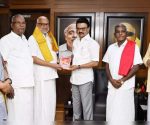No child’s play: The hills are alive with the sounds of doll making | Chennai News – The Times of India

Meet Nilah, a Nilgiri girl whose universe consists of eight family members. She lives on a farm on the fringes of the Nilgiri shola forest with her Amma, Appa, Tatha, Paati, Akka, Thambi and two Thangachis. She also has friends that are animals on the farm or in the forest. Right now, her stories are all about her Nilgiri roots but soon she will be going on adventures to other states and, in the not too distant future, other countries as well.
Nilah is a handmade fabric doll that’s transforming the way little girls look at doll play. The brainchild of Suhas Ramegowda and his wife Sunita, Nilah is the breakout product from The Good Doll, a Nilgiri startup that uses fabric scraps to make dolls hand-stitched by local rural women. The Good Doll started in mid-2023 when the husband-wife duo stumbled upon a market gap to address. “We noticed that children have only had plastic dolls as an option for decades,” says Suhas. “These dolls, apart from being an environmental hazard, have also been setting unrealistic beauty standards in a child’s mind.”
The Good Doll team had developed just a few SKUs of the dolls at that point and simply bundled them into a hamper with quilts. “The quilts didn’t sell but the dolls just took off and as we interacted with the market more, we realized we had found the gap,” says Suhas. “The market instantly gave us the name – Indian Barbie. That was the beginning of our journey with the dolls.”
Rooted in sustainability as a guiding principle, The Good Doll uses textile waste as an input material. “We were aware that there is tonnes of textile waste that is going into landfills,” says Suhas. “Since the dolls anyways needed small pieces of textile for production, it was natural for us to opt for this waste instead of using fresh yardage and cutting them up again.” Over the next two years, the two founders raised funds from Rainmatter, HNIs and Villgro for The Good Doll. They were also awarded grants from NSRCEL and TANSIM. Recently the brand made a pitch on Shark Tank India as well. “So far, we have raised 1 crore in equity and 25 lakh in grant,” says Suhas. “When we walked into the tank, we already had a soft confirmation for an additional 1 crore in equity which now is at the stage of disbursement. While all of this money is being raised for growth, we are quite self-sustained in terms of our current operations,” he says. “We are breaking even at the moment and will be profitable by the end of this financial year.”
But the real success of The Good Doll has been in creating a community ecosystem around the dolls. Right now, the dolls are made by a team of 95 women from rural and indigenous communities. “Women from the communities have grown within the enterprise and have taken up leadership roles,” says Suhas. “While Sunita and I provide the strategic direction, the enterprise is largely run by women from the communities.” By the end of FY25-26, The Good Doll plans to expand to 250 or 300 women. “Over the next 10 years, we intend to create 20,000 jobs for women from these communities and in the next three years, we expect to cross the 10 crore mark in terms of revenues,” he adds.
The Good Doll has a range of products – Nilah and her family members – targeted at parents who are “more conscious with their choices for their children” both in terms of “sustainable products” as well as the “cultural link”. That’s why Suhas and Sunita have been focusing on Nilah’s story which is also the story of the Nilgiris. “We have been good with our storytelling on social media and that has helped us with creating a digital footprint,” adds Suhas. But at the end of the day, the motto of this project is to bring back “old world charm, redesigned to suit the modern requirements and aesthetic appeal”. It’s an effort to bring back the touch and feel of a doll with a story, just like the ones stitched up by grandmothers and passed on to little ones.
















